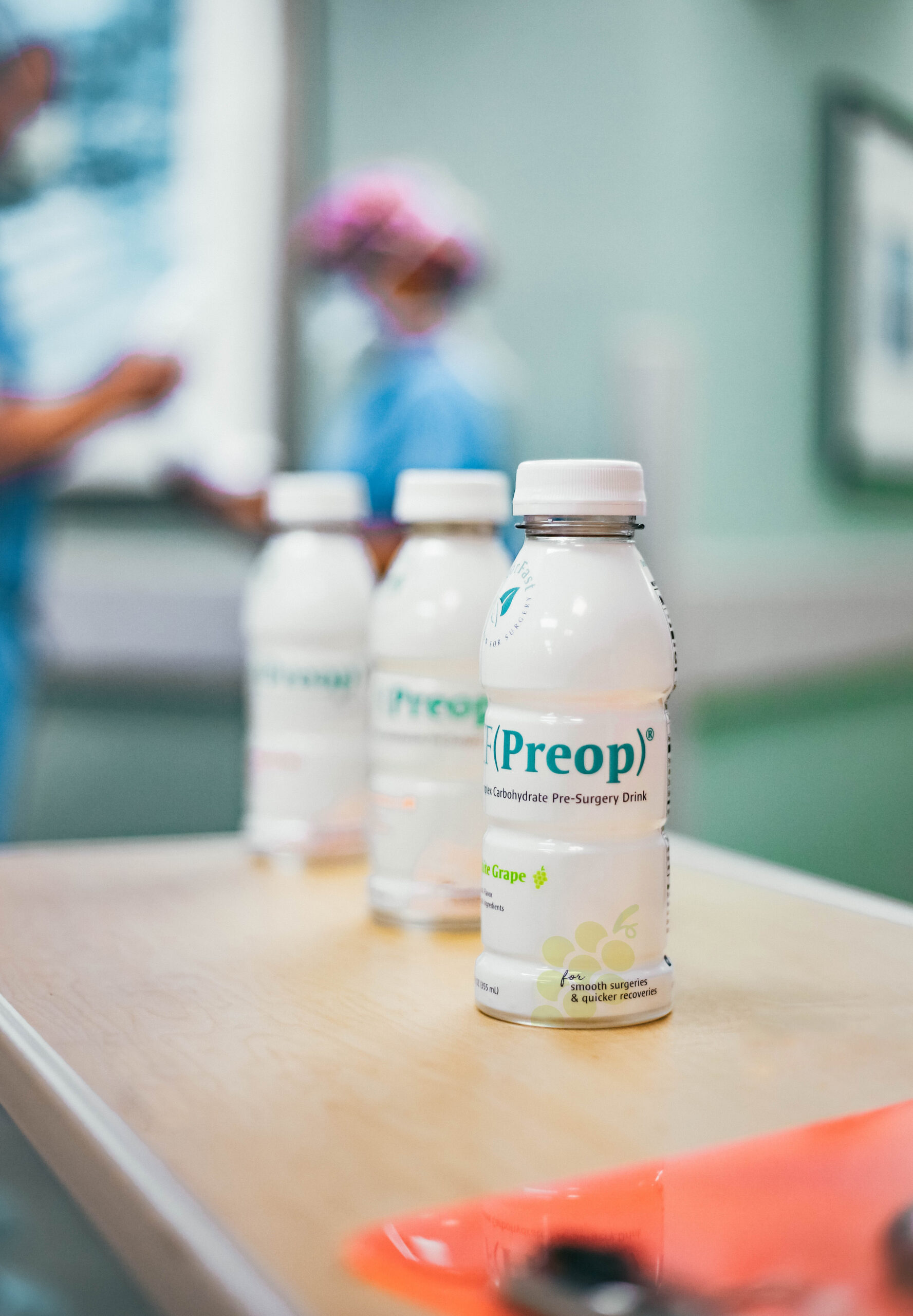Nutrition plays a crucial role in surgical outcomes. Implementing nutrition screening and correcting malnutrition before surgery can help reduce readmission rates, postoperative infections, and length of stay. By understanding the components of preoperative nutrition medical professionals can help ensure patients receive the best standard of care.
What is preoperative nutrition?
Preoperative nutrition covers a wide variety of interventions—including nutrition screens, correcting nutrition status before surgery, patient education, and carbohydrate loading up to two hours before surgery. There is a lot involved in preoperative nutrition, and understanding each component can significantly enhance recovery, which is why it is a major component of ERAS®.
Why does preoperative nutrition matter?
There is a strong association between poor nutrition status and surgical outcomes. Several studies report that preoperative nutrition to correct poor nutrition status improves outcomes postoperatively. To understand the importance of preoperative nutrition and correcting nutrition status before surgery, consider surgery analogous to a marathon. Before a marathon, you train for an extended period to ensure you will finish the race with the fastest time possible. If you have any injuries or illness, you would likely postpone running the marathon until you were healthy because, if not, you will not run as fast and perhaps wouldn’t even be able to finish the race. In the grand scheme of things, surgery is far more critical than running a marathon, so ensuring patients put in the same “training” to enter surgery at their strongest leads to smoother, faster recoveries.
What is the risk of preoperative malnutrition?
Preoperative malnutrition increases the risk for mortality and morbidity, and also increases costs. Malnutrition and cachexia are caused by proinflammatory cytokine response, inadequate dietary intake, and catabolic effects (Ward et al.). Preoperative malnutrition leads to increased susceptibility to infection, impaired wound healing, pressure ulcers, and increased length of stay (Abdelhamid et al.). Therefore, patients who are severely malnourished should correct malnutrition before surgery. In some cases, surgery is postponed until malnutrition is resolved.
Malnutrition and Surgery
Ideally, a nutrition assessment before any surgery can diagnose malnutrition. A Doctor or Registered Dietitian can evaluate the patient for mild to severe malnutrition. The Academy Adult Malnutrition Criteria (ASPEN) has specific criteria to identify malnutrition.
Research proves that malnutrition is a leading cause of poor postoperative outcomes and it is a strong predictor of 90 days mortality and poor overall survival. Ward et al. suggest that preoperative anorexia and malnutrition increase postoperative complications in Whipple procedures. Furthermore, malnutrition in patients with pancreatic cancer can lead to cancer-related cachexia, defined as greater than 10% weight loss over six months.
CF Nutrition’s Role in helping prevent malnutrition
Nutrition status can improve with recommendations from a Registered Dietitian. Typical recommendations include high-protein supplements in the weeks leading up to surgery, such as CF(Protein)®. CF(Protein)® is a plant-based protein drink patients can consume in the days and weeks leading up to surgery to optimize nutrition. It contains high-quality protein, omega-3 fatty acids, and anti-inflammatory ingredients that will enhance the immune system and optimize overall health. It is a complete nutrition product to help build muscle and strength for a speedy recovery.
Other ways to improve nutritional status can include enteral or parenteral nutrition if protein beverages are not enough to restore nutrition status. For obese patients, it is often required to lose excess weight before surgery. The macronutrient excess in those with obesity can be associated with chronic inflammation, sarcopenia, and micronutrient deficiency.
What about preoperative carb-loading?
Surgery induces a catabolic effect on the body. Reducing the fasting period can help reduce this catabolic effect and enhance recovery. Preoperative carbohydrate loading is also an essential component of preoperative nutrition. Prolonged fasting before surgery may cause detrimental effects. Prolonged fasting worsens the catabolic state, and increases metabolic stress, hyperglycemia, and insulin resistance. Furthermore, when the body fasts for a prolonged time, glycogen stores are depleted, leading to protein and muscle breakdown. Postoperative insulin resistance (PIR), a result of the stress response from surgery and further exaggerated with prolonged fasting, is related to delayed wound healing, increased morbidity/mortality, and LOS. Decreased PIR sets patients up for a smoother recovery.
Preoperative carbohydrate loading maximizes glycogen stores in the body as an energy source to minimize body tissue degeneration and reduce PIR. When you change the metabolic state by shortening preoperative fasting, PIR decreases, protein loss drops, and muscle function will improve. Additionally, preoperative carbohydrate loading increases patients’ comfort and reduces hunger, thirst, and anxiety leading up to surgery. Ultimately decreasing stress entering surgery. Our anesthesiologist-developed product, CF(Preop)®, may be consumed before surgery to enhance recovery and shift the body from a fasting to a fed state.
How does preoperative nutrition benefit the medical professional?
Screening patients’ nutritional status, correcting malnutrition and providing preoperative nutrition benefits patients and medical professionals alike. The patient will benefit from a smoother recovery—while the medical professional will benefit from cost savings, reduced length of stay and postoperative complications, increased patient satisfaction, and lower readmission rates.
In summary, preoperative nutrition is a critical component of surgery. Nutrition screenings, correcting malnutrition, and preoperative carbohydrate loading are necessary interventions before performing surgery. CF Nutrition is here to help you better understand preoperative nutrition and how to incorporate it into your practice. Our products promote a smooth recovery and improved surgical outcomes.

